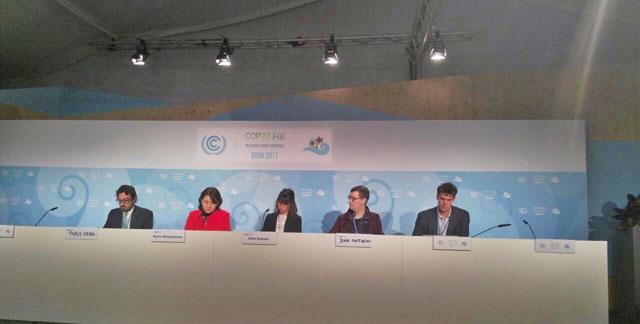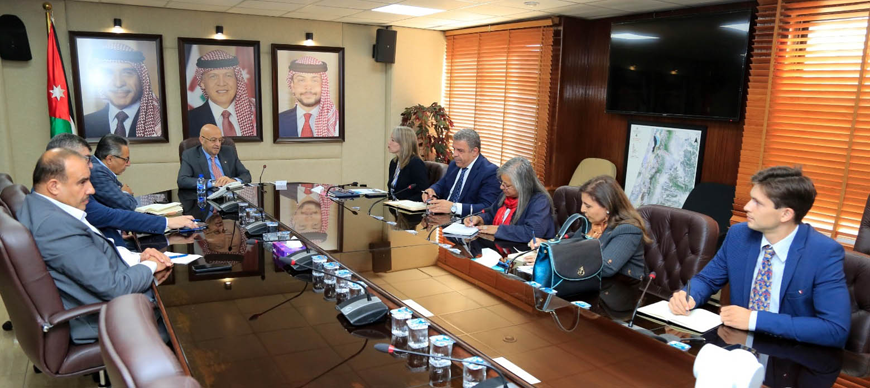You are here
‘Challenges enormous when it comes to water security’
By Hana Namrouqa - Nov 15,2017 - Last updated at Nov 15,2017

Eighty per cent of countries’ Nationally Determined Contributions (NDCs) contain water related actions in their adaptation measures, water experts said at a conference in Bonn on Tuesday (Photo by Hana Namrouqa)
BONN — Eighty per cent of countries’ Nationally Determined Contributions (NDCs) contain water related actions in their adaptation measures, water experts said on Tuesday, estimating the annual cost for the implementation of water goals at $50-60 billion over the next decade.
They argued that water is the most frequently cited sector at NDCs, with proposed actions ranging from conservation to food security, sanitation, urban resilience and energy.
At a press conference held by the Global Water Partnership (GWP), the water experts discussed financing water security and adapting it to the implementation of NDCs, which are national commitments by each country signatory to the Paris Agreement to reduce national emissions and adapt to the impacts of climate change.
Article four, paragraph two at the Paris Agreement requires each party to “prepare, communicate and maintain successive nationally determined contributions that it intends to achieve”, according to the website of the United Nations Convention on Climate Change.
GWP Chair Oyun Sanjaasuren said that demand for water is set to exceed the available resources, citing figures that indicate that 20 per cent of the world’s population will be at risk of floods by 2050.
She underlined that reports show that benefits of strategic investment in water security exceed hundreds of billions of dollars annually.
“…, today more than 2.4 billion people still lack access to improved sanitation, so it’s absolutely clear that scale of investment needed is big and is going to increase,” Sanjaasuren said.
Investment is required to protect populations, cities, economies and ecosystems from water related risks, such as droughts, floods, inadequate access to safe drinking water supplies, sanitation and degradation of water systems, she said.
“The challenges are really enormous when it comes to water security,” she underlined.
The water expert said that the NDCs of most countries clearly state that water is the main challenge to progress and the main limiting factor for the implementation of the Sustainable Development Goals.
“It is very important not only to understand the world challenges and threats to water security but also to figure out the solutions, which include unlocking financing to water security and adaptation,” Sanjaasuren argued.
NDC Partnership Global Director Pablo Vieira revealed that 80 per cent of NDCs contain water-related actions under the adaptation measures.
Vieira underlined that some countries are facing droughts and thus focusing on water scarcity in their NDCs, while others are facing floods and the rest are facing both, which necessitates flexible and comprehensive solutions.
“Water is not only an issue of adaptation; there are lots of implications in terms of mitigation… we can reduce emissions from water use and water treatment,” Vieira said.
He noted that interlinking adaptation and mitigation is a huge challenge, which needs plans that are based on specific water risks and opportunities, highlighting that such plans need to be incorporated in current and future NDCs as well as national and sectoral policies and plans.
Related Articles
AMMAN — Minister of Water and Irrigation Raed Abul Saud on Sunday held discussions with United Nations Resident Coordinator for the United N
AMMAN — A study conducted by the Jordan Health Aid Society - international (JHASi) revealed a “good” level of knowledge about climate change
AMMAN — Minister of Planning and International Cooperation Nasser Shraideh on Monday held a meeting with Gelsomina Vigliotti, vice pre




















